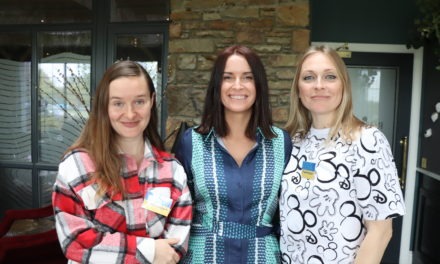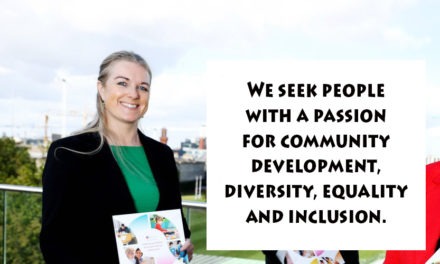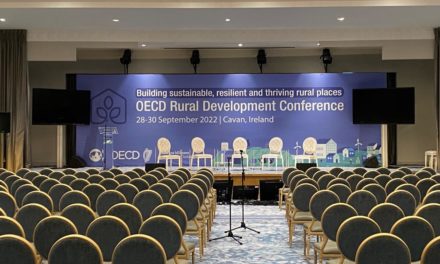Free Irish language and sean-nós dance classes are being offered to new Irish communities in Meath, Louth and Cavan this month through a collaboration by Cultúr Migrants Centre and Conradh na Gaeilge. The online classes are some of the many events taking place across the country – mostly online – during this year’s Seachtain na Gaeilge.
“Initiatives such as these, while they may seem tokenistic, actually play a very important role in helping migrants and refugees to assimilate and integrate into Irish society and culture,” says Sorcha Grisewood who interviewed those involved in the collaboration:
BY SORCHA GRISEWOOD
– Gaeilge is part of the cultural puzzle newcomers face
– Free courses offered in Meath, Louth & Cavan
– eg Do you know the Irish for Navan?

Photo, left to right: Sean Ó Murachadha, Conradh na Gaeilge and Tinu Achioya, Cultúr’s programme manager.
Sean Ó Murachadha is an integration officer with Conradh na Gaeilge and his work involves reaching out to new communities, from migrants to asylum seekers and refugees. No better time than now, as Seachtain na Gaeilge began yesterday, Monday, March 1st, and will last until March 17th*.
“Irish is an integral part of the puzzle for new Irish communities trying to understand the cultural landscape of Ireland,” he says, “The more they understand about the language, the easier it will be for them to integrate into and participate in a society so moulded by its own unique language. It’s important especially for our new communities to show them that the Irish language and culture is for them as much as anyone else.”
* * * * *
Reuben Hambakachere, an integration officer with Cultúr, based in Navan, welcomed the collaboration with Conradh na Gaeilge, saying “any kind of contact” is useful and is valued by people new to Ireland. While they may have access to information, “they may not be able to interact with their neighbour or have any Irish contacts”, he said.
Reuben works with international protection applicants from 29 countries in direct provision and temporary accommodation centres in Slane, Laytown and Mosney. His work entails a community development approach and he facilitates orientation courses, information sessions and leadership courses. Cultúr also works with organisations such as Spirasi to support individuals who experienced trauma or torture.
He says his job is mainly about “building resilience and supporting integration”.
Since many migrants and refugees have children who in school, and because the Irish language is a compulsory subject, it helps the children if in turn their parents have ‘cúpla focal’ themselves.
While you don’t need to be able to speak Irish or dance ‘sean-nós’ yourself to integrate into Irish society, it helps to know a little. As Seán points out, something as simple as knowing the Irish word for ‘Navan’ is ‘An Uaimh’ can help migrants to read maps and road signs and obtain a sense of place.
Knowing basic phraseology, understanding the meaning of surnames and place names and knowing a little bit about the history of a country can help migrants to understand the people and place they’re living in a little better.
* * * * *

Language classes, pre-covid.
For instance, Priscilla Amankwatia from Ghana, recently attended an Irish language workshop and found it “very interesting”. What struck her most were similarities between Ireland and Ghana with our shared history of colonisation by the English. She maintains that English “was imposed” on the Ghanaian people as well and that if she were Irish she would feel “robbed” of her “heritage” and “would push for the language to be brought back”.
Whether or not you agree with Priscilla’s views, it’s clear that workshops and collaborations with Irish organisations can help to bridge the divide between ‘us’ and ‘them’ by highlighting our similarities as well as our differences.
* * * * *

Tinu Achioya ag gáire.
According to Tinu Achioya, Cultúr’s programme manager,
“When we host events like this, we work directly with the community in a collaborative manner…it’s about sharing our knowledge and our resources to ensure that we have the most intercultural County Meath possible and that smaller groups are given the foundations needed to flourish. As a migrant organisation we always want to ensure that our reach is as diverse as possible.”
As well as informing and educating, initiatives such as this can also help migrants to feel more invested in the place where they are living and to have a greater sense of belonging. This can only be good.

*This particular collaboration with Conradh na Gaeilge is funded by the Department of Justice’s Integration Fund.
** While ‘seachtain’ means week, this year’s festival runs for over a fortnight, from March 1-17th.
Cultúr is also launching a fundraising campaign at the moment. More details at: http://cultur.ie
To contact Tinu Achioya, tel 046-9093120/086-0111742.




